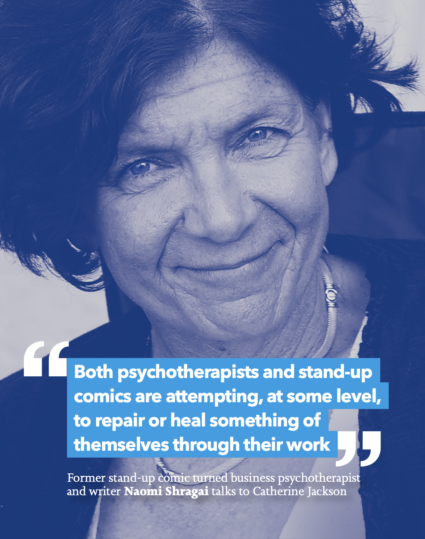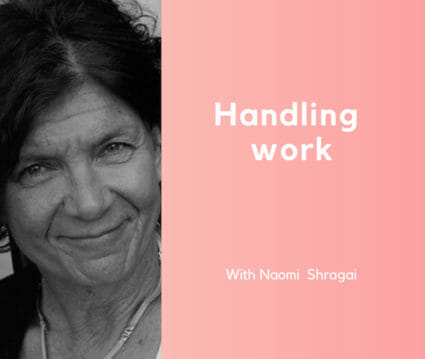 Catherine Jackson: Reading your biographical details in your book, you have had quite a mixed career. How did you get from being a stand-up comic and journalist to where you are today – a business psychotherapist and workplace coach with a thriving private practice?
Catherine Jackson: Reading your biographical details in your book, you have had quite a mixed career. How did you get from being a stand-up comic and journalist to where you are today – a business psychotherapist and workplace coach with a thriving private practice?
Naomi Shragai: If I were to answer that question I’d have to say quite a lot about my life! I won’t start right at the beginning, but just to say I trained initially as an occupational therapist, and then joined a community mental health team in north London, where I trained in family therapy, working with families who had a member with a mental illness. I then completed my psychotherapy training at the Tavistock Clinic. A period of my life followed where I worked as a psychotherapist in the afternoons, while training to teach the Alexander Technique in the mornings, which was another strand in my career, and then in the evenings working as a stand-up comic. And at the weekends, to supplement my income, I worked as a clown, entertaining children at parties. It was a pretty intensive time!
I emerged from that period to work as a family therapy consultant for the Priory Group and Nightingale Hospital for some years. Along the way, I discovered a love for writing. I approached The Times with a personal piece – a feature about a psychotherapist trying to get inside the head of a football fan (my husband is a mad football fan). It was my attempt to bring psychotherapy to comedy. The Times invited me to continue to write for it and I discovered that journalism appealed to me much more than academic writing. I much preferred the jargon-free approach of journalism.
And meantime, quite a lot of people were bringing work-related issues to my psychotherapy practice. I began to notice that people were acting out their early family dramas more at work than at home, which I found fascinating. This prompted an idea for an article that brought a psychodynamic understanding to workplace difficulties, about fathers struggling to balance work and family life. It was published in the Financial Times [FT], and had quite a strong reaction from the paper and from readers. It was clear that my psychodynamic and systemic therapy approach to workplace issues was quite new, certainly to the FT. Organisational psychologists had pretty much dominated the area with their behavioural approaches, and my approach, which is not unique to me, seemed to touch a nerve among readers.
This was about 10 years ago, when people’s emotional lives were rarely discussed in the FT, let alone understood. I was talking about people dealing with strong emotions in the workplace – about paranoia, about envy, about imposter syndrome, and for the FT it was something of a revolution to be highlighting these themes. And this led to more people coming to me with work- related issues, and so my private practice also developed in that direction.
CJ: So your career combines psychotherapy and comedy. Is there much that is funny about psychotherapy?
NS: My attempt really was more to apply psychotherapy to comedy than the other way around. For me, comedy helped me maintain a balance in my life. Working as a psychotherapist, as I have now for more than 30 years, is a very intense lifestyle, and while comedy is intense, it is also outrageous and spontaneous. When I am sitting in a room with a client, that time is devoted entirely to them and my thinking is on them, of course. Working as a stand-up comic, the focus changes entirely. It’s all about me, and the attention is on me.
CJ: Do you think psychotherapy takes itself a bit too seriously at times?
NS: Psychotherapy is a very serious business. We are entering into people’s emotional lives; it’s a very intimate relationship; people are making themselves very vulnerable with us, and it’s important to take that seriously. It is up to the individual therapist or counsellor how they bring themselves and their sense of humour into the session. We psychotherapists and counsellors can become so preoccupied with boundaries that we exclude part of ourselves rom the therapeutic relationship, and that includes our sense of humour.
CJ: You say in your book that stand-ups just want to be noticed and applauded. Arguably those aren’t the qualities of a good psychotherapist or coach. So what are the similarities?
NS: There aren’t many, for the reasons I’ve explained. But I can say that both psychotherapists and stand-up comics are attempting, at some level, to repair or heal something of themselves through their work. For psychotherapists, that is often why they enter the profession. Many of us are basically looking for love. Stand-ups are doing much the same. If you are standing on a stage and people are laughing at your jokes and you are really going down a storm, in that moment you do feel deeply loved. Of course it’s not real, but it does feel that way. So if you are looking for love – and I think somewhere in myself I was wanting to affirm my lovabil ity – then going on stage repeatedly is a real motivation. But you can say that about most professions and your choice of work.
CJ: In the book you vividly describe the awful experience when the audience didn’t laugh and you didn’t know why; there was just hostility coming at you – so why did you go back for more?
NS: That’s a good question, one I should have asked myself many times! How on earth could anybody risk that sort of humiliation repeatedly? For me, certainly, when it works well, for that moment there is such a feeling of being loved and it is so appealing that it becomes compulsive to return to the stage. You get an intense high out of it. And you see that in other professions: the risks people take at work are very addictive – they get a huge adrenalin rush, and a lot of people seek to maintain that through overworking. People rely on that kind of rush to lift their mood and feel better about themselves, and over time it becomes addictive.
Unconscious motivations
CJ: How do you work? Is it long-term, short-term? And how is what you do different from workplace counselling and EAP work?
NS: There are some distinctions from how I work as a psychotherapist and from, say, an organisational psychologist in that I focus on the individual’s unconscious motivations rather than solely their behaviour and thinking. And I don’t see people for intensive psychotherapy.
I normally see people once a fortnight, or every few weeks or perhaps once a month, and the focus is always on work-related issues. They come to me because they have already had some good advice or attended workplace coaching or they’ve read some books about their problem, but they are still somehow not able to change enough to correct it. My approach is to go deeper and find out what the underlying motivational problems are and why they are unable to change. When people come with work-related problems – they have a difficult boss, for example, or they are procrastinating or undermining themselves, or their imposter feelings are interfering with their ambitions – they have good, conscious motivations for wanting to excel in their work. But alongside that are the unconscious motivations that undermine their ambitions. So, while the conscious part of them is wanting to succeed, an unconscious part of them is working to resolve something deeper from their early life, their internal life – some unmet longing or early trauma that has been replicated in the workplace. And those unconscious motivations are sometimes in conflict with their conscious motivations. These are the links I try to present to clients.
This is different from organisational psychologists, for example, who take a much more behavioural approach: ‘How can we alter their behaviour, alter their thinking?’ My approach is to dig a bit more deeply, see what people might be acting out from their internal life, their early family life, in the workplace. It is a more psychodynamic and systemic approach.
CJ: Are you ever employed by an organisation to work with their employees, to be a psychotherapist to the organisation?
NS: Most organisations I work with are not happy for me to call myself a psychotherapist. They tend to prefer that I call myself a business coach. There is still a stigma around psychotherapy in the business world, an association between psychotherapy and mental illness. Organisational psychologists and psychology are more readily accepted because of their behavioural approach. I’d love to see more psychotherapy in the workplace. And yes, I am often employed by an organisation but under their coaching umbrella. Businesses are often looking for short-term solutions and quick fixes to problems, and one can understand that – they have a business agenda. So examining problems more deeply doesn’t always align with business thinking. But often that is a very short-sighted approach because, unless we understand what is going on at this deeper unconscious level, either within the individual or within the organisation, it can be harder to identify and resolve whatever the difficulty is, and you may be setting yourself up for more problems further down the line.
CJ: What interests me is the dynamic where the priorities of the business and its interests differ from those of the client. So who is your client?
NS: This is a really important question. When I work with a company, I have to hold in mind the person in front of me and the organisation as a whole and the dynamics between them. I think my training and my years of systemic practice with families help me do this. But it is not an easy position. One way I deal with it is that I make it clear to the client that, although our conversations are confidential, I will be reporting back to the organisation on our progress, and that anything I report to the organisation I will discuss with the client first. But we are both clear that I am employed by and working for the organisation.
Family patterns
CJ: Could you talk a bit more about how and why we play out in the workplace the patterns of behaviour we have adopted in our family or origin?
NS: You have to imagine and understand that everyone at work is acting out their family dramas to some degree, although we hope most people have the maturity to be able to contain some of that. It doesn’t necessarily create a problem, but it can do, because sometimes people misread situations as being, let’s say, more traumatic than they actually are, or they imagine that people are against them, or they’ve been neglected by their boss. Essentially, individuals are confusing people in their present workplace with people in their past. Work isn’t there to respond to our emotional needs, of course, so people can readily feel they’ve been neglected or forgotten or treated unfairly. Our workplace becomes an arena where we act out our early family experiences. It’s quite common, for example, that people will confuse their boss or other authority figure with feelings they have about their parents. What I often hear from leaders is that they are at the receiving end of various people’s grievances and longings. It’s difficult for leaders as well. Leaders need to have the capacity to hold such projections without reacting, because it isn’t personal, but it can feel so for both the employee and the boss. Those feelings are quite powerful in the workplace and if they are similar to situations from one’s childhood, they can ignite an intensity that can be overwhelming. It’s important to help people separate out the past from the present and recognise that the intensity of their feelings might be located more in their past and in their early family life than in the present workplace. Once they have made that separation in their minds, then they can recognise what actually is happening, and although it might be difficult, they might not experience it with the intensity that they did previously. They can then respond to what is actually happening rather than to what they imagine is happening
CJ: You describe in the book a lot of situations where those patterns are being played out. It seems endemic and deeply toxic. I am wondering if there are any ways organisations can harness that tendency for the good?
NS: Organisations and the people who run them aren’t psychotherapists, although sometimes I think that could help! But a lot of the traits people bring from their childhood are of course useful and contribute to businesses enormously. For example, people who have experienced neglect as a child may defend themselves by making themselves indispensable so they can’t be ignored, and this makes them very good company employees. People who are people- pleasers and people who avoid conflict have navigated these situations as a child and evolved strategies to deal with these circumstances, and when they bring the same strategies to the workplace, that can be really useful.
One of the things I find is that the defensive strategies people learned in order to protect themselves in their early lives are precisely the same traits that make them successful as adults, but that makes it even more difficult for them to change. If they let go of these traits and habits, it might jeopardise their work or career. So why give them up, you might ask? I have found that there comes a time in one’s career, normally at a time of promotion, when these same strategies are exposed and can suddenly become more problematic. For example, in a leadership role one may need to give up perfectionistic tendencies because there is simply not the time to get everything right. Or, an individual can avoid conflict in the workplace when focusing solely on your area of expertise, but as leader, avoiding conflicts can harm the business and people in it.
CJ: Does this also happen on the shop floor, at the supermarket checkout, at the call centre?
NS: I work in many industries, not only finance. People are people and everybody brings their emotional lives with them wherever they go. If we find ourselves in situations that remind us of our earliest experiences, those strategies will be ignited once again. It’s just what it is to be human.
CJ: It seems from your examples in the book that the most common problem is perfectionism and people’s high expectations of themselves and others, which largely derive from their experience of their mothers. I’m being slightly flippant here, but are all successful senior executives, male and female, basically trying to please or appease their mothers?
NS: It’s right that many of the examples in my book are people whose mothers were either withholding or negligent and there was an intent in the work to repair all sorts of attachment issues, but people’s relationships with their fathers are very significant here as well. Basically, in all these circumstances, people are attempting to repair or resolve at work something that stems from their early life. Put plainly, for many individuals, they are trying to somehow achieve or capture those moments of care and love that they had in childhood but didn’t have nearly enough of, and that longing can be very powerful. Of course, they’ll never be fully satisfied, because the person from whom they long for this is their mother or their father and so it’s a never-ending longing.
Mainly, people claim to be seeking validation in the workplace. But when we dig more deeply, we can understand that validation is really another word for love – we hope that, if we get enough validation from other people in the workplace, if other people think we are wonderful enough, then we will believe in our own lovability.
Healthy narcissism
CJ: You devote a chapter to the workplace narcissist, and you attempt to defend them, or at least not totally condemn them. Can you explain what you mean by ‘healthy narcissism’?
NS: First, we all have elements of narcissism. It’s a trait, not a personality type as such. We all need a healthy dose of it in order to be able to function. It’s simply a belief in ourselves, and if we didn’t have it, we wouldn’t be able to take risks, or express our views and be creative in the workplace. We need to be able to believe in ourselves – our talents, our opinions and views and thoughts – to be the best we can be at work. But it falls along a continuum. Midway along the continuum is a healthy or productive narcissism. These individuals have the confidence to get others behind them and have the belief, energy and enthusiasm to get things done. But people with healthy narcissism also have empathy – they can recognise that their success depends on other people’s success, and they can put other people’s needs ahead of their own. That is the significant difference – they have empathy and will encourage other people to do well. What is often described as narcissism is malignant narcissism – people who cannot rein in their selfishness and have an extreme sense of entitlement. These are people who harm their employees and those who directly report to them. The word is thrown about so recklessly, but just because someone is charismatic, intelligent and – by the way – good- looking doesn’t make them harmful.
CJ: You ask in the book ‘Will work ever love you back as much as you want it to?’ What is your answer to your own question?
NS: Of course, my answer is yes – and no! You can use work to build your self-worth. If you’ve achieved at work, done a good job, made good relationships then yes, work has loved you back. But what it takes is the capacity to hold on to your own achievements, to recognise what you have done well. People who say work can’t love them back are those who always have a sense that they haven’t achieved enough – they persistently disregard or dismiss their achievements.
CJ: What about retirement then? When you stop working and you have spent all your adult life trying to win work over to loving you – what then?
NS: Yes, it is a problem for those in that situation, as it is for those who are made redundant. They have to face the reality that work cannot be everything. It’s something most people have to examine in their lives. Work can offer so much, and you can achieve so much, but it’s not everything.
CJ: Work isn’t your family and your boss isn’t your mother?
NS: That’s right!
© This article was first published in Therapy Today, the journal of the British Association for Counselling and Psychotherapy (BACP)
 as featured in the Financial Times
as featured in the Financial Times


